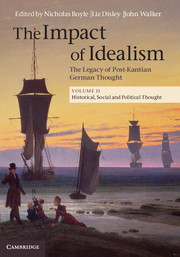Book contents
- Frontmatter
- Contents
- List of Contributors
- Acknowledgements
- List of Abbreviations
- Introduction: Idealism in historical, social and political thought
- 1 From transcendental idealism to political realism
- 2 The public of the intellectuals – from Kant to Lyotard
- 3 Idealism and the idea of a constitution
- 4 German Idealism and Marx
- 5 Ethos, nature and education in Johann Erich von Berger and Friedrich Adolf Trendelenburg
- 6 The concept and philosophy of culture in Neo-Kantianism
- 7 After materialism – reflections of Idealism in Lebensphilosophie: Dilthey, Bergson and Simmel
- 8 ‘Rationalisation’, ‘reification’, ‘instrumental reason’
- 9 Freedom within nature: Adorno on the idea of reason's autonomy
- 10 German neo-Hegelianism and a plea for another Hegel
- 11 Idealism and the fascist corporative state
- 12 Love and recognition in Fichte and the alternative position of de Beauvoir
- 13 Hegel's concept of recognition and its reception in the humanist feminism of Simone de Beauvoir
- 14 Giving an account of oneself amongst others: Hegel, Judith Butler and social ontology
- 15 Idealism in the German tradition of meta-history
- Bibliography
- Index
- References
6 - The concept and philosophy of culture in Neo-Kantianism
Published online by Cambridge University Press: 05 December 2013
- Frontmatter
- Contents
- List of Contributors
- Acknowledgements
- List of Abbreviations
- Introduction: Idealism in historical, social and political thought
- 1 From transcendental idealism to political realism
- 2 The public of the intellectuals – from Kant to Lyotard
- 3 Idealism and the idea of a constitution
- 4 German Idealism and Marx
- 5 Ethos, nature and education in Johann Erich von Berger and Friedrich Adolf Trendelenburg
- 6 The concept and philosophy of culture in Neo-Kantianism
- 7 After materialism – reflections of Idealism in Lebensphilosophie: Dilthey, Bergson and Simmel
- 8 ‘Rationalisation’, ‘reification’, ‘instrumental reason’
- 9 Freedom within nature: Adorno on the idea of reason's autonomy
- 10 German neo-Hegelianism and a plea for another Hegel
- 11 Idealism and the fascist corporative state
- 12 Love and recognition in Fichte and the alternative position of de Beauvoir
- 13 Hegel's concept of recognition and its reception in the humanist feminism of Simone de Beauvoir
- 14 Giving an account of oneself amongst others: Hegel, Judith Butler and social ontology
- 15 Idealism in the German tradition of meta-history
- Bibliography
- Index
- References
Summary
Neo-Kantianism represents a third strain of modern Idealism, following Kant's transcendental and Hegel's absolute Idealism. It understood itself as a form of cultural-philosophical idealism and was the dominant academic philosophy in the German-speaking world from 1870 to 1920, indeed ‘the only philosophy of world significance’. People came from all over the world to study it, in both of the main schools, the Marburg school of Cohen, Natorp and Cassirer, as well as the south-west German school of Windelband, Rickert, Lask, Cohn and Bauch. Although it was by no means united in its substantive positions, it was held together by a basic framework and represented a new and highly promising type of philosophy. The basis of its predominance was an interpretation of Kant that addressed contemporary problems, and a further development of Kant's ideas that envisaged the working out of philosophical problems in all fields.
Back to Kant
The return to Kant entailed a desire for an idealism that differed from post-Kantian systems and was free from their encumbrances, and the search for a new foundation for a systematic philosophy that the decline in Hegelianism had discredited. It was above all in the natural sciences that systematic philosophy had been discredited, and where there was a strong anti-philosophical resentment. Idealism's speculative flights of fancy, its devaluation of the empirical, Hegel's philosophical claim to have presented the knowledge contained in the individual natural and human sciences scientifically (i.e. philosophically) had aroused protest in those sciences. Especially his philosophy of nature, but increasingly too his philosophy of history and art were seen by representatives of the specialist positive sciences as an assault. Hegel's philosophy was seen as scientifically inadmissible.
- Type
- Chapter
- Information
- The Impact of IdealismThe Legacy of Post-Kantian German Thought, pp. 136 - 160Publisher: Cambridge University PressPrint publication year: 2013



